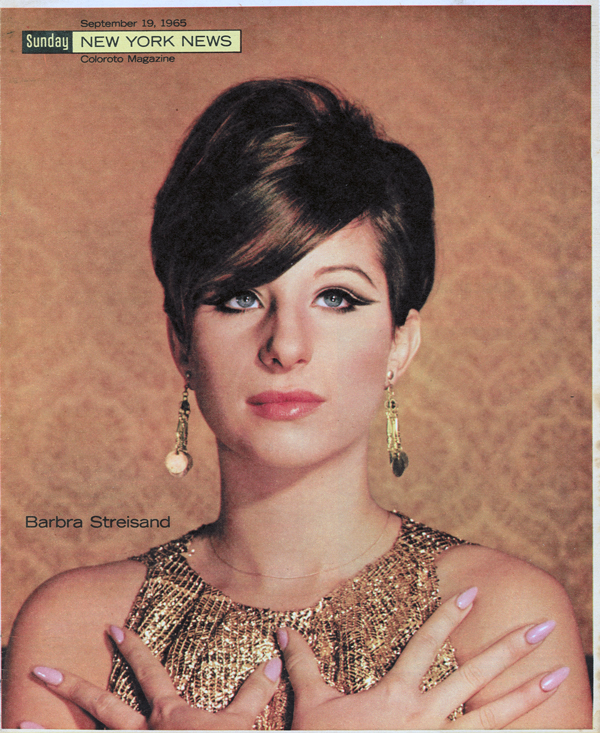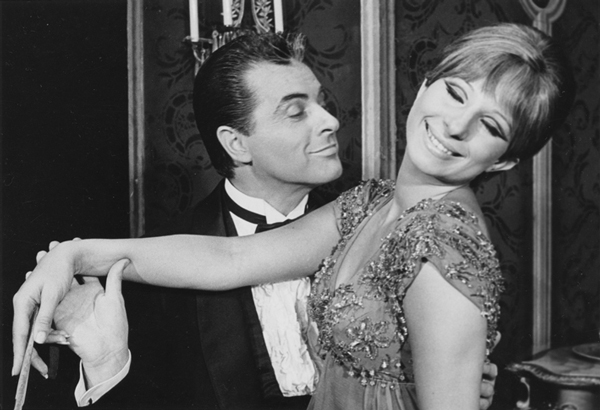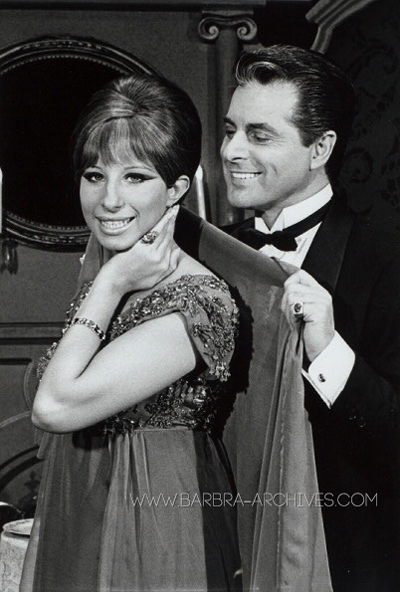Sunday New York News Coloroto Magazine
September 19, 1965

Barbra Archives Note: Although Barbra appeared on the cover of the Sunday magazine, there was not a major article about her inside. Instead, the following two paragraphs appeared inside the cover of the magazine:
At 7, Barbra Streisand went to the movies and came out knowing she was going to be a star. Today, at 23, Barbra is the focal point of a show biz cult of fervid fans who applaud her in every medium: her record albums have earned over $1,000,000; her TV special, "My Name is Barbra," seen last April and due for a repeat in October, is considered one of the year's best; she sang to a capacity house of over 15,000 at Forest Hills last July; she has signed a TV contract that will probably bring her $5,000,000 in the next 10 years, and she is, of course, the star of Broadway's "Funny Girl." Movies? Her screen stardom is inevitable.
Barbra was born in the Flatbush section of Brooklyn on April 24, 1942. Her father, a high school teacher, died when she was an infant, and her mother went to work as a bookkeeper. At 17, Barbra was graduated from Erasmus Hall High School (with a 93 average and the Spanish medal). A year later, having parted with a job as a switchboard operator and run through her last unemployment check, she entered a talent contest in a Greenwich Village bar and won a week's engagement as a singer. In March, 1962, she opened on Broadway in "I Can Get It For You Wholesale," and stole the show. Besieged with offers, she went on to sing in top spots across the country and won a reputation as a marvelous "kook" on TV talk shows. She opened on Broadway in "Funny Girl" on March 14, 1964, and stardom was hers.
Barbra married actor Elliott Gould in March, 1963.

Barbra Archives Note: The following article appeared in the Sunday News section of the same paper:
Johnny Arrives at the Garden
By ROBERT WAHLS
BARBRA STREISAND has a new Nicky Arnstein at the Winter Garden, a fellow named Johnny Desmond. No one could be happier than Johnny and, presumably, "Funny Girl" herself, now that her professional difficulties with Sydney Chaplin are over.
"I'm a reactor, not an actor," Johnny says. "I cut my vocal chords on Detroit radio, and off bandstands with Gene Krupa and Glenn Miller. But this is what I've always wanted."
Johnny has co-star billing with Barbra. Meanwhile, Sydney is drawing $2,100 a week until his contract expires April 1, 1966, for not playing the part Johnny is playing.
It was a case of mushrooming incompatibility between Barbra and Sydney. The first year was the hardest.
Daughter's Advice
"Daddy, you've never seen the show," Desmond's daughter, Diane, 18, said when she heard he was to audition. "You never wear a tie or dark suits. Nicky Arnstein is suave, and wears tails and ruffled shirts. He's cool. Daddy, play it cool."
Johnny was singing at the Hotel Roosevelt in New Orleans, and took his day off to fly here for an audition.
Producer Ray Stark, composer Jule Styne and lyricist Bob Merrill liked him. The final decision was up to Barbra. She gave it.
"I flew in on July 1 after studying the script between shows in New Orleans," Johnny told me. "That was a Thursday and I arrived at 5 P.M. I was at the theatre at 6 and rehearsed until 8."
On Monday, July 5 Desmond was to take over. Production stage manager Torn Stone wondered aloud if Johnny wouldn't like another week of rehearsals. Understudy George Reeder could carry on.
"They were worried because I was always carrying the script," Johnny remembered. "They assumed I didn't know the part. I told them it was that night or never, maybe. Barbra had a rash — nerves. It's rough on everyone to integrate a new lead in an established hit.
"I played 'Kismet' in stock last summer on four days notice. There was no reason I couldn't play Nicky. After the first act, Barbra's rash was disappearing.
"'You didn't miss a line,' she told me. To me, it was a rave review.
"People don't talk off stage in the theatre. It's not like the easy-going band days, with bull sessions far into the night. I began to get memos from Toni Stone about my performance until they came out of my ears.
"I asked Tom if these were from Barbra and he told me some were, so I asked for a meeting with her to talk things out. We talked for two hours on stage and I told her I was happy in my work, that I was a hero to my wife and kids because I was playing opposite her. And I wanted a good working relationship.

"I couldn't steal the show from her if I stood on my head and yodeled and I don't want to even think in those terms or have anyone else think so. I want her to feel secure in my performance."
Johnny was Giovanni Alfredo de Simone, son of a Detroit grocer, when he broke into Detroit radio at 11. He was Gene Krupa's vocalist when he went into the Air Force and, by the simple expedient of writing Glenn Miller, he replaced Tony Martin as Miller's Air Force Band vocalist. Martin wanted to be an officer. You couldn't be an officer and sing with a band.
Recalls Miller's Death
"I'll never forget how the fact of Glenn Miller's death dawned on us. He had flown from Bedford, England, ahead of us," Johnny remembered. "We arrived by transport three days later at Orly Field, Paris. He'd been missing three days and no one knew until we asked for him.
"They never found his body."
Radio's Breakfast Club, TV's Your Hit Parade, night clubs and Broadway's "Say Darling" and such hit records as "The Yellow Rose of Texas," "C'est Si Bon" and "The High and the Mighty" have kept Johnny vocal.
"I lost interest in being just a singer years ago , " said Johnny, who resembles a cheerful Marlon Brando. "A musical is exactly what I wanted."
End.
Related Links: Funny Girl, Broadway Show pages
